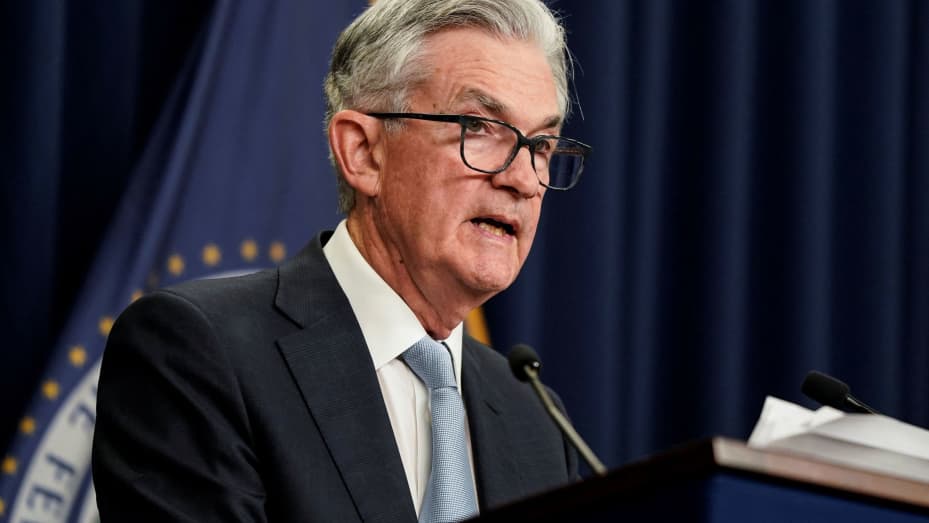
Federal Reserve Chair Jerome Powell reiterated to lawmakers on Thursday that the central bank expects to raise interest rates one or two more times this year, but at a slower pace to avoid tipping the economy into recession.
“The strong majority of the committee believes that it will be appropriate to raise the federal funds rate again once or twice by the end of the year,” Powell told the Senate Banking Committee, echoing comments he made Wednesday before the House Financial Services Committee.
“A strong majority came down on twice between now and the end of the year. So I think the data will tell us what to do.”
The comments from Powell as part of his semi-annual testimony to Congress came amid a wave of other hawkish central bank hikes announced Thursday, underlining the determination of policymakers to bring down inflation worldwide.
The Bank of England decided to increase UK interest rates by 50 basis points, to 5%. Norway and Switzerland also hiked rates to levels not seen for long over a decade.
The Fed’s own approach to taming inflation was one of several topics covered by Powell during his two hours before the Senate committee. Another was the prospect of higher capital requirements for the largest US banks.
He made it clear that any new proposals from the Fed on that subject would not affect lenders with fewer than $100 billion in assets, getting more specific about the cutoff than he was on Wednesday.
“The capital requirements will be very skewed to the eight largest banks,” Powell said in testimony before the Senate.
“For community banks and any banks under $100 billion, I don’t think they’re going to be part of this proposal. So we’re really talking about principally the very largest banks, and to a lesser extent, the regionals and then the banks between $100 to $250 billion.”
The regional banks that were seized by regulators earlier this year all fit into that last category, including Silicon Valley Bank.
‘We’re relatively close’
Powell’s comments about rate hikes and inflation come roughly one week after the central bank decided to hold off raising rates at its last policy meeting while raising its rate forecasts for this year. That signaled rates could rise to as high as 5.6%, implying two additional rate hikes are likely this year. Three officials saw rates rising closer to 6%.
Powell told lawmakers Thursday that the point of the last policy meeting was to slow down the decision-making process after raising rates quickly last year.
“We’re relatively close, we think to where we need to get,” said Powell. “…As we get closer and closer to what we believe will be, it’s uncertain, but we think our destination, we’ve slowed down a little further. We’re trying to avoid the mistake of going too far and that’s all it is.”
The interest rate projections released last week also showed a 2024 cut in rates by 100 basis points to 4.6%.
Powell said the Fed will need to be confident inflation is moving back to 2% before cutting rates and said he doesn’t see that happening any time soon. In fact, the Fed chair seemed to imply that perhaps a rate cut forecast for next year is a preliminary sketch and will depend on inflation coming down.
“That’s going to depend on how the, how the economy performs and inflation is just consistently proven more persistent than we’ve expected.”
Democrats voiced concerns that more interest rate hikes will hurt job growth and families.
Senate Banking Committee Chairman Sherrod Brown (D-Ohio) questioned why the Fed would maintain interest rates at the current level or consider raising rates again given the risk of causing job losses for more than a million and a half workers.
“Mr. chair, what Fed governors call cooling down, regular people where I live, call them layoffs,” said Brown. “I mean the question is why should working families continue to bear the cost of fighting inflation? Why should they lose their jobs so that corporate profits can continue to balloon?”
How much is too much?
Some Republican committee members expressed concern that higher capital requirements for banks being contemplated by the Fed would restrict lending, unfairly punish smaller community banks, and perhaps even slow the economy, echoing comments made by House Republicans on Wednesday.
“I do not believe that increasing significantly the capital standards is in the best interest of small businesses or people looking for loans,” Republican Ranking Member, Senator Tim Scott (R-S.C.) said. “The more capital we put on the sidelines, the less capital there is for us to see our financial institutions loaning the money out.”
When asked by Senator Scott how much is too much when it comes to higher capital requirements, Powell acknowledged that there’s a tradeoff between ensuring more stability and the impact on lending, which is something the Fed will carefully consider.
Fed Vice Chair for supervision, Michael Barr, is the Fed official overseeing a so-called holistic review of capital requirements. Barr has said that he believes higher requirements may be necessary for some mid-sized institutions, along with other changes to bank supervision. A proposal from the Fed is expected this summer.
Following the failure of Silicon Valley Bank, Powell said there’s a clear need to strengthen both supervision and regulation of banks of that size and that the Fed needs to take lessons from the failure.
“I am personally committed to learning the right lessons from what happened in Silicon Valley Bank and the other two failures and implementing vigorously, implementing appropriately,” said Powell. “…We’re going to take appropriate measures to reduce the chances that something like that would have.”
Powell also said the Fed has been proactively reaching out to banks on commercial real estate loans coming due to help them wade through any defaults.
Smaller banks are the ones with higher concentrations in real estate, he said, implying systemic risk could be low from any commercial real estate loan defaults.
























